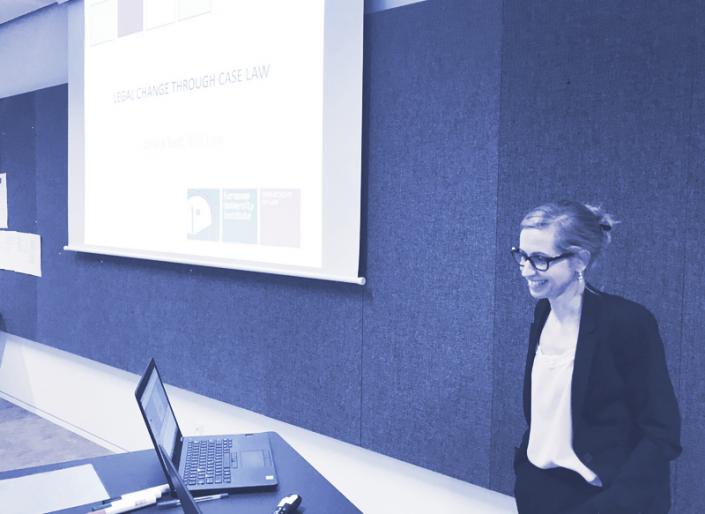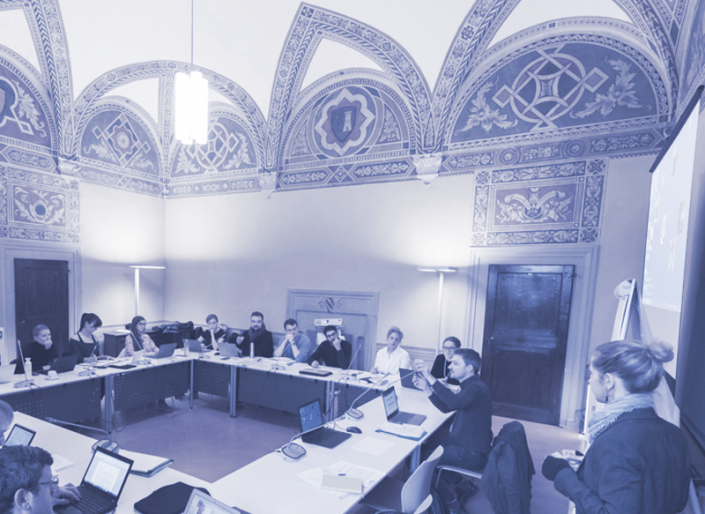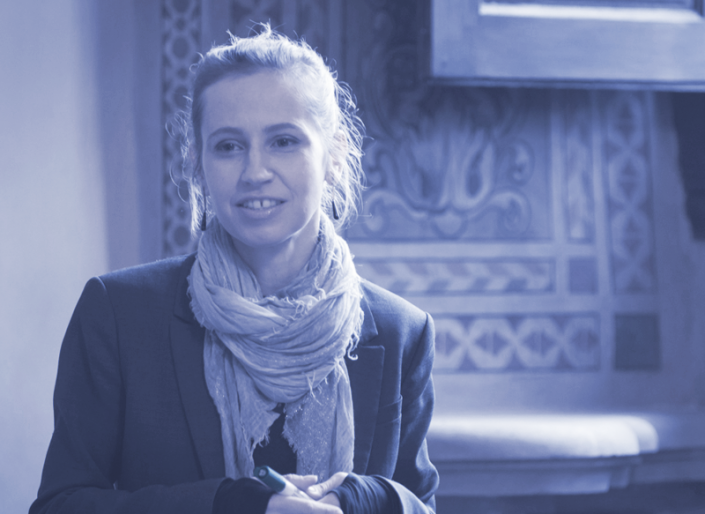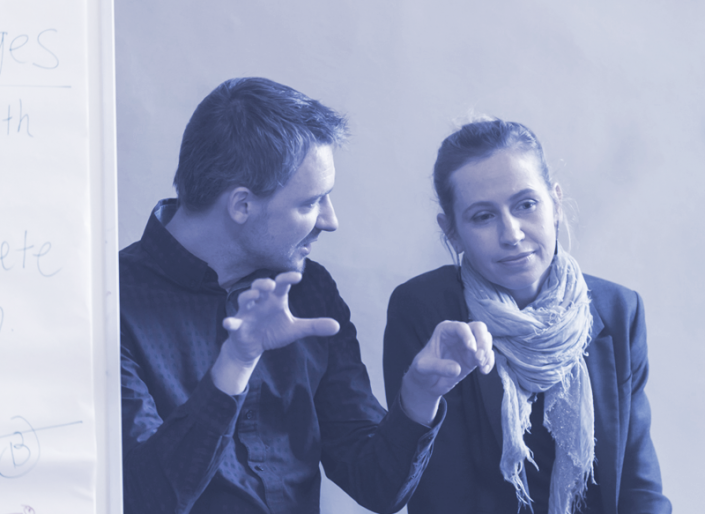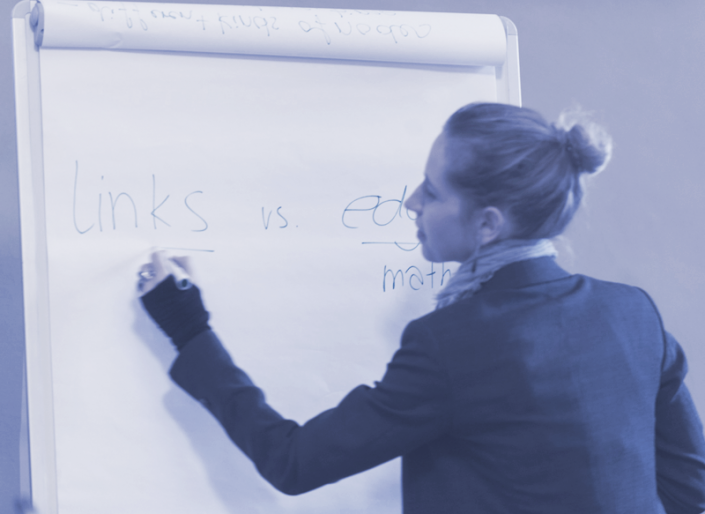Urška Šadl
Professor of Law
Appointed professor at the EUI in September 2016. Her primary research interests include the empirical studies of European courts and their jurisprudence, the language of courts, the theory and practice of judicial precedents as well as topics in European constitutional law more generally. She is joining the EUI after working at iCourts centre of Excellence for International Courts at the Faculty of Law in Copenhagen. She obtained her BA and Master degree in law from the Faculty of Law in Ljubljana. Urška also holds a LL.M. degree in Legal Studies from the College of Europe in Brugge and a PhD degree from the University of Copenhagen. She has completed research stays at King’s College, London, Institute of European and Comparative Law at the University of Oxford and most recently visited the University of Michigan as Michigan Grotius Research Scholar. Her research appears i.a. in the European Law Journal, the European Law Review, the European Journal of Legal Studies and the European Constitutional Law Review.
Research Projects
NoLesLaw (Network of legal empirical studies), with Johan LINDHOLM (Umeå) and Suvi SANKARI (Helsinki), an initiative funded by the Nordic Research Council (from January 2017 – December 2018). No-Les-Law brings together a group of original thinkers, motivated by the desire to develop and promote novel approaches to legal research that favor data over speculation. The initiative is primarily motivated by the desire to investigate the empirical foundations behind theoretical claims, and examine the potential impact of legal rules on daily practice and policy making of European and international legal institutions. Furthermore, the initiative is striving to develop a continuous dialogue between legal scholars and social scientists that ask the research questions of how law and courts work, and computer scientists and mathematicians who have the necessary technical expertise in developing novel research methods that can answer these questions. Finally, the initiative is driven by the lack of dissemination outlets of legal empirical research, which does not follow the large-N research agendas common in the United States, including discussion platforms such as workshops, data sharing websites, and empirically oriented law journals.
D2D (From dogma to data), with Henrik Palmer Olsen (Copenhagen) The project is funded by the Danish Free Research Council (December 2014 – November 2017). The project investigates how international courts make law through case law, using automated processing of textual contents and network analysis of legal texts.
Supervision Interests
“I welcome PhD proposals that deal with the jurisprudence of the European Court of Justice, and all matters judicial law making. I will be particularly happy to supervise students that are willing to develop novel research methodologies to gauge legal change or are up to the challenge of applying existing legal empirical methods. I give priority to proposals, which focus on judicial responses to broader developments (and current issues) in the European Union. For more information in this regard please see current courses and teaching activities.
As a supervisor I am easily approachable and considerate. I value straightforward communication and constructive criticism. From my supervisees I expect commitment to their project, clear focus on their goals, and the ability to work independently”
Related links
URŠKA ŠADL
Curriculum vitae
Email: urska.sadl@jur.ku.dk
Phone: +45 2791 4233 (DK)
RESEARCH INTERESTS
Judicial decision making, empirical legal methods, international courts, Court of Justice of the European Union, legal language, EU constitutional law, European citizenship
POSITIONS
June 2016 Professor, European University Institute, Florence
April 2016 Associate professor, Faculty of Law, Copenhagen (on special leave)
2013 – 2016 Assistant professor, Faculty of Law, Copenhagen
EDUCATION
PhD, Faculty of Law, University of Copenhagen
PhD thesis: The European palimpsest: justificatory practices and precedent construction at the Court of Justice of the EU (defended in November 2012)
Master of Laws (Postgraduate degree), Faculty of Law, University of Ljubljana
Master of European Legal Studies (LL.M.), College of Europe, Bruges
Bachelor of Law, Summa cum laude (BA), Faculty of Law, University of Ljubljana
AFFILIATIONS
2016 Global Research Fellow: iCourts centre of excellence for international courts, Copenhagen
2015 Grotius Visiting Research Scholar, University of Michigan, Ann Arbor
2011 Visiting scholar, Institute of European and Comparative Law, University of Oxford, Oxford
2009 Visiting scholar, Centre of European Law, King’s College, London
PUBLICATIONS
Articles and chapters
- Why did European citizenship jurisprudence change? (forthcoming in Questioning EU Citizenship, ed. Daniel Thym, Bloomsbury/Hart, 2017, with Suvi Sankari).
- The (Elusive) Influence of the Advocate General on the Court of Justice of the EU (forthcoming in Yearbook of European Law, first view available at DOI: www.doi.org/10.1093/yel/yex001, with Suvi Sankari)
- Mutual Disempowerment: Case C-441/14 Dansk Industri (on behalf of AJOS A/S) v Estate of Karsten Eigil Rasmussen and Case no. 15/2014 Dansk Industri (DI) acting for Ajos A/S vs. The estate left by A (forthcoming in European Constitutional Law Review, first view available at DOI: www.doi.org/10.1017/S1574019617000116, with Sabine Mair)
- The Preliminaries of a Reference (reflection article) (forthcoming in European Law Review, with Graham Butler)
- Competing Supremacies and Clashing Institutional Rationalities: The Danish Supreme Court’s Decision in the Ajos Case and the National Limits of Judicial Cooperation (forthcoming in European Law Journal, with Mikael Rask Madsen and Henrik Palmer Olsen)
- Theorizing General Principles of EU Law in Perspective: High Expectations, Modest Means, and The Court of Justice (introduction) (General Principles of Law: European and Comparative Perspectives, ed. Stefan Vogenauer, Stephen Weatherill, Hart Publishing, 2017, with Joxerramon Bengoetxea)
- Can Quantitative Methods Complement Doctrinal Legal Studies? Using Citation Network and Corpus Linguistic Analysis to Understand International Courts ((2017) 30 Leiden Journal of International Law 327, with Henrik Palmer Olsen)
- Selecting the Cases that Defined Europe: Complementary Metrics for Network Analysis (The 2016 IEEE/ACM International Conference on Advances in Social Networks Analysis and Mining (ASONAM), San Francisco, 2016, with Fabien Tarissan and Yannis Panagis)
- Sovereignty in Post-Sovereign Society, A Systems Theory of European Constitutionalism, Jiří Přibáň (book review, (2016) 53 Common Market Law Review 841)
- A ‘Selfie’ from Luxembourg: The Court of Justice and the Fabrication of Pre-Accession Case-Law Dossiers ((2016) 22 Columbia Journal of European Law 327, with Mikael Rask Madsen)
- Did the Financial Crisis Change European Citizenship Law? An Analysis of Citizenship Rights Adjudication Before and After the Financial Crisis ((2016) 22 European Law Journal 40, with Mikael Rask Madsen)
- The Force of EU Case Law: An Empirical Study of Precedential Constraint (JURIX proceedings, The Foundation for Legal Knowledge Based Systems, 2015, with Yannis Panagis)
- What is a Leading Case in European Union Law: An Empirical Analysis ((2015) 40 European Law Review 15, with Yannis Panagis)
- The Role of Effet Utile in Preserving the Continuity and Authority of European Union Law: Evidence from the Citation Web of the Pre-accession Case Law of the Court of Justice of the EU ((2015) 8 European Journal of Legal Studies 19)
- National courts and the effectiveness of EU law, in National Courts and EU Law: New Issues, Theories and Methods (Bruno De Witte et al (ed.), Edward Elgar Publishing 2015)
- European Interpretive Enterprise, in Rettens magt – Magtens ret (Helle Krunke (ed.) DJØF 2014)
- Precedent in the Sui Generis Legal Order: A Mine Run Approach ((2014) 20 European Law Journal 544, with Sigrid Hink)
- Case – Case-Law – Law: Ruiz Zambrano as an Illustration of how the Court of Justice of the European Union Constructs its Legal Arguments ((2013) 9 European Constitutional Law Review 205)
Working papers and Research in progress
- Landmark cases in EU Law and how to spot them in the crowd with Fabien Tarissan
- Principled incrementalism: an empirically based theory of legal change
- The Force of EU Case-Law: An Empirical Study of Precedential Constraint, with Yannis Panagis (iCourts Working Paper 68/2016)
International conferences, workshop presentations, and invited talks
- Leading cases in European Union Law, invited lecture at Copenhagen Centre for Social Data Science (SODAS) Inaugural Lecture Series (University of Copenhagen, June 2017)
- Landmark cases in EU Law and how to spot them in the crowd with Fabien Tarissan, presented at NoLesLaw Workshop (organizer, with Suvi Sankari, Helsinki, and Johan Lindholm, Umeå) (University of Umeå, Sweden, March 2017)
- Interpretive twists, argumentative turns, and new reference frames: Unpacking the jurisprudential shift in the European citizenship jurisprudence (EU law discussion group, University of Oxford, November 2017)
- Principled incrementalism: The interplay of rhetoric, reasoning, and remedies in the landmark cases of the Court of Justice of the European Union (Research Seminar at the European Institute, London School of Economics, February 2017)
- Interpretive twists, argumentative turns, and new reference frames: Unpacking the jurisprudential shift in the European citizenship jurisprudence (Lunch seminar, University of Cambridge, February 2017)
- Do International Courts Make Law in Small Steps?(Seminar at the 11th session of the Brandeis Institute for International Judges, The Authority of International Courts and Tribunals: Challenges and Prospects, Copenhagen, June 2016)
- Do International Courts Make Law in Small Steps? The Case of the European Court of Justice (First Conference on Empirical Legal Studies in Europe (CELSE Amsterdam, June 2016)
- A New and Restrictive Approach to EU Citizenship Rights: The Perspective of the Advocates General (The Judicial Deconstruction of Union Citizenship / The Limits of Free Movement & Solidarity in the EU, University of Konstanz (Konstanz, April 2016)
- No Case is an Island, Entire of Itself: The Judicial Construction of EU Law, with Amalie Frese, selected for the presentation at ESIL Research Forum (Istanbul, April 2016)
- The Force of EU Case-Law: An Empirical Study of Precedential Constraint, with Yannis Panagis, First Society for Empirical Legal Scholars Global Workshop for Junior Empirical-Legal Scholars, Jerusalem, December 2015
- No Strings Attached: Precedent in EU Law, with Yannis Panagis, Precedent in EU Law: The Linguistic Aspect, workshop organized in conjunction with the Irish Centre for European Law (Dublin, December 2015)
- Moderator and discussant of Session General Principles of European Union Law for the Conference General Principles of Law: European and Comparative Perspectives, Celebrating 20 Years of the Institute of European and Comparative Law (Oxford, September 2015)
- Making EU (Case)Law: Evidence From a Paragraph-to-Paragraph Network on the Cases Concerning the Citizenship of the European Union, with Yannis Panagis, First Workshop on Law and Big Data: Empirical and Data-Centric Techniques for Legal, Judicial, and Administrative Systems – In Conjunction with the Fifteenth International Conference on Artificial Intelligence and Law (ICAIL San Diego, June 2015)
- The Court, the Crisis, and the Citizenship of the Union, with Mikael Rask Madsen, A workshop on The impacts of the economic crisis on the European system of human rights, University of Strasbourg (Strasbourg, June 2015)
- Judicial Incrementalism and Supranational Judicial Authority, presented at ESIL Annual Conference, The Judicialization of International Law – A Mixed Blessing? (Oslo, September 2015)
- Becoming European: (Legally): Unpacking the Self-Portrait of the EU Legal Order in the Pre-Accession Case-Law Dossiers, with Mikael Rask Madsen, 9th Annual Conference of Empirical Legal Studies (Berkeley, November 2014)
- Becoming European: (Legally): Unpacking the Self-Portrait of the EU Legal Order in the Pre-Accession Case-Law Dossiers, with Mikael Rask Madsen, ASIL midyear research forum (Chicago, November 2014)
- Counting on International Courts, with Henrik Palmer Olsen, ASIL midyear research forum (Chicago, November 2014)
- Reinventing The Founding Myths of Europe: The Continuous Relevance of the Constitutional Milestones of the EU Legal Order; EURECO Distinguished Lecture Series, Copenhagen (September 2014)
§ Unpacking the Self-Portrait of the EU Legal Order in the Pre-Accession Case-Law Dossiers; The CJEU, Law and the Economy, International Workshop, Helsinki (September 2014)
- Fragments of a Judge-Made Constitution: A Network Based Analysis of Constitutional Change in the EU; The Centre of Excellence in Foundations of European Law and Polity 5th Annual Conference; Helsinki (September 2013)
- Law Via Case-Law: Is effectiveness a Law-Making Argument of the Court of Justice of the European Union?; European case-law methods in action; Copenhagen (April 2013)
- European Citizenship and Identity: a Seamless Web?, EU Enlargement: Identities, Values and Market; Jean Monnet Chair of European Public Law; Dubrovnik, Croatia (April 2012)
- A Theory of Adjudication for the Sui Generis Legal Order: A Mine Run Approach, Constitutionalization in Question: revisiting the Foundational Logics of European Integration by Law; Copenhagen (December 2011)
- Sturm und Drang in the Legal Reasoning of the European Court of Justice – Making a Case for Citizenship, EURECO International Conference: Europe in the World – Challenges and Dynamics; Copenhagen (September 2010)
- Comparing precedent, International Graduate Conference, King’s College, London (April 2010)
PROFESSIONAL QUALIFICATIONS AND MEMBERSHIPS
Member of the Slovenian Bar Association (Ministry of Justice, Slovenia)
Member of the European Society for International Law
LANGUAGES
Slovene (mother tongue); English, Danish, German, Croatian (all fluent), French (good command)
SCHOLARSHIPS AND AWARDS
2016 Grant to organize a series of workshops and establish a network of legal empirical scholars (NoLesLaw), awarded by The Swedish Research Council for Independent Research
2013 Sapere Aude – research talent award by Danish Research Council for Independent Research
2013 Individual research grant, awarded by the Danish Research Council for Independent Research
2009 PhD Scholarship, The Danish Ministry for Science and Education, Faculty of Law, Copenhagen
2003 LLM scholarship of the Government of Slovenia (College of Europe, Bruges)
2003 LLM scholarship of the Central Bank of Slovenia (College of Europe, Bruges)
RESPONSABILITIES / EVENTS
2017 – NoLesLaw: workshop series and network of empirical scholars (convener, with Suvi Sankari and Johan Lindholm)
2016 – Constitutional pluralism, the European way: Dead or alive? (International seminar, iCourts Centre of Excellence, Copenhagen (convener)
2016 – The practice of interpretation of European courts: International workshop, iCourts Centre of Excellence, Copenhagen (convener)
2014 – 2016 Co-Editor of iCourts Working Paper series
2014 – 2016 Convener of Science Lab, the iCourts work in progress research seminar
2013 – 2014 Responsible for the organization of iCourts lunch seminar series and guest lectures
2013 European case-law methods in action: International workshop, iCourts Centre of Excellence, Copenhagen (convener, with Anne Lise Kjær)
2011 – 2012 Member of the PhD committee, Faculty of Law, Copenhagen
2010 Law and politics after Lisbon: International post-graduate conference, Faculty of Law Copenhagen (organizer)
TEACHING
At the University of Copenhagen:Advanced EU constitutional law (MA level), Advanced EU constitutional law – essay class (MA level), EU litigation practice (BA level, Fall 2015), Empirical research methods in law (PhD course with individual feedback on PhD projects, convener, Fall 2015), supervision of BA and MA projects in EU law (general), and European Constitutional Law,
At the European University Institute: Network approach to case law (Fall 2016), Current issues in EU law (Spring 2017), Theory Lab (December 2016, short course), Research Question workshop (December, 2016)
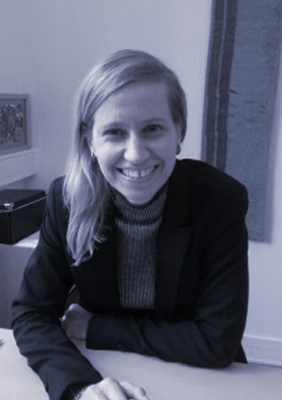
Contact details
Tel. [+39] 055 4686 363 / 275
Email: Urska.Sadl@EUI.eu
Administrative Assistant: Agnieszka Lempart
Postal address: Law Department | Via Bolognese 156 | 50139 Florence – Italy (Villa Salviati, Manica – Office SAMN 221)
Working Languages: Slovene, English, Danish, German, Croatian, French


